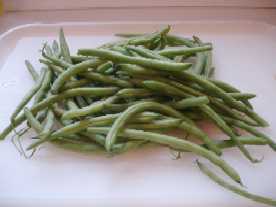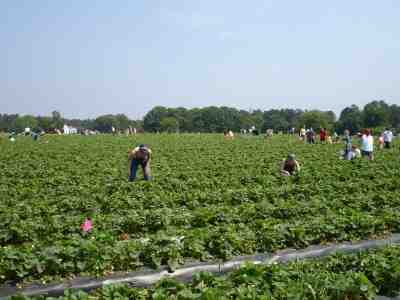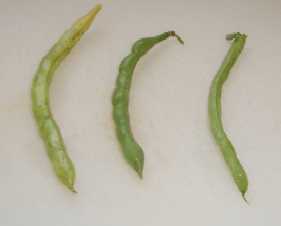
Bean U-Pick Orchards in Tampa area, Hillsborough and Pinellas counties, west Florida in 2024, by county
Below are the U-Pick orchards and farms for beans that we know of in this area.
Not all areas of a state have beans orchards that are open to the public. If you know of any others, please tell us using the add a farm form!
Remember to always check with the farm's own website or Facebook page before you go - or call or email them if they don't have a website or Facebook page. Conditions at the farms and crops can change literally overnight, so if you want to avoid a wasted trip out there - check with the farm directly before you go! If I cannot reach them, I DON'T GO!
PLEASE report closed farms, broken links and incorrect info using the "Report Corrections" form below.
Hillsborough County
- Big Bear Farms, Inc - ORGANIC, beans, blueberries, broad beans, carrots, corn (sweet), eggplants, okra, onions, peas, peppers, summer squash, tomatoes, other vegetables, Other fruit or veg, prepicked produce, restrooms
7606 Kinard Road, Plant City, FL 33565. Phone: 813-986-1152. Email: bigbearfarms@verizon.net. Open: crops available, days and hours vary with the season; Please check on our website or call for current days and times. Directions: From Tampa take I-4 East to Exit 14 \(Mcintosh Road \) Turn Left \(North\) on Mcintosh and go under overpass to first road on Right. Turn Right on Gore Road and take curve to Left where road turns into Gallagher Road Travel North on Gallagher to Kinard Road on Right. NOT Kinard Cove. Turn Right on Kinard Road and farm is 14 mile on Right. Click here for a map and directions. Payment: Cash, only. Fax: From Tampa take I-4 East to Exit 14 (Mcintosh Road ) Turn Left (North) on Mcintosh and go under overpass to first road on Right. Turn Right on Gore Road and take curve to Left where road turns into Gallagher Road Travel North on Gallagher to Kinard Road on Right. NOT Kinard Cove. Turn Right on Kinard Road and farm is 1/4 mile on RightCrops are usually available in March, April, May, June, July, October, November, December. We are certified organic for all crops! Cabbage, Collards, Mustard, Turnips, Lettuce, Spinach, Okra. Big Bear Farms, Inc. is a family owned and operated Certified ORGANIC Fruit and Vegetable farm. We operate under the strict rules of the USDA - National Organic Program (NOP) and are certified by Quality Certification Services (QCS). Unlike many farms that only claim to be organic we are the REAL DEAL and have the documents proudly on display to prove it. Why buy imported fruit and vegetables from unregulated countries that have been sprayed with all types of banned chemicals when you can have better at lower prices.Not only do we supply the commercial market with blueberries, we also take pride in our ability to provide the individual local public comsumer with that personal touch in the growing, processing and packing that they deserve in supplying the needs of their families. (UPDATED: July 28, 2010, by phone) - Hydro Harvest Farms - Uses integrated pest management practices, beans, beets, broccoli, carrots, cucumbers, eggplants, herbs or spices, onions, peas, peppers, summer squash, strawberries, tomatoes, other vegetables, Other fruit or veg, U-pick and already picked, farm market, concessions or refreshment stand, porta-potties are available, picnic area, school tours
1101 E Shell Point Rd, Ruskin, FL 33570. Phone: 813-645-6574. Email: terrie@hydroharvestfarms.com. Open: In March 2021, their website says "U-Pick Farm is Temporarily Closed We want everyone to stay safe and we will get through this" normally, Monday through Saturday 10 am to 5: Sunday 11 am to 4; June through August hours differ so please check our website for more info. Directions: Take I 75 to Exit 240, Ruskin. Go west and at second light turn right \(21 street east\). Go to stop sign \(Shell Point Road E\), turn left. farm will be 12 mile on the left. . Click here for a map and directions. Payment: Cash, Check, Debit cards, Visa, MasterCard, Discover, AmEx, SFMNP Vouchers.
Hydro Harvest Farms Facebook page. . Alternate Phone: 941-915-7208 Picking updates: Click here for picking updatesTake I 75 to Exit 240, Ruskin. Go west and at second light turn right (21 street east). Go to stop sign (Shell Point Road E), turn left. farm will be 1/2 mile on the leftWe have many seasonal crops all year round, to pick; Strawberries are usually ready starting in December and go through May We have free Hydroponic Growing Classes, Canning Classes, Halloween Boo Fest Even (see our website for this year's date in October)), Santa at the Farm, Easter Eggstravaganza Event; Sign up for our weekly email for updates on what is picking and what free events we have; The sign up info is on our website. We use integrated pest management practicesis a hydroponic vertical growing farm. We use no pesticides, very little water, 1/6 the land and teach families, schools and businesses how to do this themselves. We have a great Grant Website for School Gardens. We have school field trips and a nice picnic area to make a nice day of picking.If you are coming to pick your own, we use no GMO, we supply the baskets and scissors if you need them, you don't have to bend to pick, the farm is covered for easy mobility and best of all we love pets!.
Feedback
Green Bean, Lima Bean, Shelled Beans Picking Tips, Recipes and Information
When are fresh beans available?
Beans are a warm weather crop, and won't grow much in cold soil. It takes them about 60 to 70 days from seed to harvest.
In the U.S. beans typically peak in harvesting from June through October in the South, and in July to September in the North. But they can be ready as early as early June in many places, if the weather is good.
Before you leave to go to the farm:
- Always call before you go to the farm - it's hard to pick in a muddy field!
- Most growers furnish picking containers designed for beans, but they may charge you for them; be sure to call before you go to see if you need to bring containers.
- Bring something to drink and a few snacks; you'd be surprised how you can work up a thirst and appetite! And don't forget hats and sunscreen for the sun. Bugs usually aren't a problem, but some deet might be good to bring along if it has been rainy.
Tips on How to Pick Beans
Whether you pick beans from your garden or at a Pick-Your-Own farm, here are a few tips to keep in mind.
Tips on How to Pick Green Beans
- Most beans these days are "stringless". That refers to a string, tough filament of the bean that runs along the outside from one end to the other. Some beans have two, one on each side; and some have one.
- I prefer to snap the bean off the plant just below where the stem attaches to the bean. If you do this, it will save time when you get home, because one end of the bean has already been trimmed. But this only makes sense if you will be using, cooking, canning or freezing the beans that day.
- If you won't be using the beans the same day, then break off the bean from the plant along the thin stem that connects the bean to the plant.
- The beans snap off pretty easily. hence the name "snap beans".
- Pole beans are the easiest to pick, because, since they grow up poles or twine, you don't have to squat down or bend over!
- Beans are ready for harvest when the pods are plump and firm, but not yet bulging. .
- In your own garden, pick your beans regularly to encourage more growth and prevent the pods from becoming tough and stringy.
- To harvest, hold the stem of the plant with one hand and gently snap the pod with the other..
Look for string, snap or green beans that are :
-
firm

- green (not yellowish - unless you're picking yellow beans!)
- smooth, not wrinkly on the surface - that's an old or dried out bean. Snap beans are best when the pods are firm and snap readily, but before the seeds within the pod develop. The tips should be pliable
- not lumpy - those lumps are the beans that are developed - that's an overripe green bean! Of course, if you want mature beans (not including the pod) then that's a different story, but we're talking about green beans here).
-
The beans in the photo at right are, from left:
- old and yellowing,
- overripe and lumpy; and
- dried out and damaged. - Avoid placing the picked beans in the sunlight any longer than necessary. It is better to put them in the shade of a tree or shed than in the car trunk or on the car seat. Cool them as soon as possible after picking. I prefer to bring a cooler with ice in it. Green Beans may be kept fresh in the refrigerator for 3 or 4 days
When you get home
- After harvesting, store your beans in the refrigerator or blanch and freeze them for longer storage.
- Put them in the vegetable crisper in the fridge, in a loose plastic bag.
- They will be good for about a week like that.
Bean recipes and home canning
Now, get ready to can or freeze the extra beans - It is VERY easy! Click on the links for easy instructions.
- How to can green beans, yellow beans, snap beans, broad beans, etc.
- How to make pickled beans
- How to freeze green beans (and other beans)
- How to Freeze Lima Beans, Broad beans, Butter Beans and/or Pinto Beans
- Canning fresh shelled beans
- Canned dried beans and peas (from kidney beans, peas, lima beans, broadbeans, chickpeas, pole beans, etc.)
- Canned Baked Beans With Tomato or Molasses Sauce
- Canned Baked Beans With Back, Pork or Ham and Tomato or Molasses Sauce -
- Pickled green beans
- Pickled Dill beans
- Mustard beans (pickled mustard beans)
- Pickled Three-Bean Salad
Varieties
There are many different types of beans, each with their own unique flavor, texture, and growing requirements. Some of the most popular varieties include:
- Green Beans: Also known as snap beans or string beans, green beans are a classic garden staple. They can be eaten fresh or cooked and come in bush and pole varieties.
- Lima Beans: Lima beans (called Broad Beans or Butter Beans in the UK) are a nutritious and protein-rich vegetable that can be eaten fresh or dried. They require a long growing season and prefer warm temperatures.
- Pole Beans: Pole beans are a climbing variety of bean that require support to grow. They can reach up to 10 feet tall and have a longer growing season than bush beans.
- Dried Beans: Dried beans are a versatile pantry staple that can be used in soups, stews, and other dishes. Popular varieties include black beans, navy beans, kidney beans, black beans, garbanzo (aka, chick peas) and pinto beans
- s, navy beans, kidney beans, black beans, garbanzo (aka, chick peas) and pinto beans
Other Local Farm Products (Honey, Horses, Milk, Meat, Eggs, Etc.)
(NOT pick-your-own, unless they are also listed above)
- Farm markets and roadside stands
- Local Honey Finder
- Local Meat, Milk and Eggs
- Venues: Farms, Wineries, Orchards for your event, wedding or party
- Easter egg hunts
- Children"s consignment sales
- Fruit and vegetable festivals
- Winery tours and wine tastings
- Horse rides, stables, lessons, trails
- Maple Syrup farms and sugarworks
- Bed & Breakfasts on Farms, Wineries, Ranches and Orchards
- Pumpkin patches
- Corn mazes
- Zombie Paintball venues
- Christmas Tree Farms & lots
- Environmental resources
- Consumer fraud information
- Wholesale food sources
- Resources for Farmers
Looking for canning equipment and supplies?
Water bath canner with a jar rack
Pressure canners for gas, electric and induction stoves: Presto 23Qt or T-fal 22Qt
Canning scoop (this one is PERFECT)
Ball Blue book (most recent version)
Jars: 8oz canning jars for jams
Find Other types of farms:
Farm markets and roadside stands
Road trips and camping resources
Local Honey, apiaries, beekeepers
Consumer fraud and scams information
Home canning supplies at the best prices on the internet!
Maple Syrup Farms, sugarworks, maple syrup festivals
Environmental information and resources
Farms For Your Event for birthday parties, weddings, receptions, business meetings, retreats, etc.
Festivals - local fruit and vegetable festivals
Get the
most recent version of
the Ball Blue Book
With this Presto 23 quart pressure canner and pressure cooker, you can "can" everything, fruits, vegetables, jams, jellies, salsa, applesauce, pickles, even meats, soups, stews. Model 01781

You can make jams, jellies, can fruit, applesauce, salsa and pickles with water bath canners, like this Granite Ware 12-Piece Canner Kit, Jar Rack, Blancher, Colander and 5 piece Canning Tool Set

